

/en/access2003/viewing-and-adding-table-records/content/
Information in a record is likely to change over time, when someone moves from one address to another, or when someone else changes his or her phone number. Information can be changed in any field of any table record.

Sometimes you will need to change the entire contents of a field, like if someone has a new address. In Access, you can select an entire field for editing:
 Warning! When attempting to edit an entire field, be careful not to move the mouse pointer so far to the left that you click on the Record Selector (the pointer will change to an arrow pointing right) and select the entire record. In Access, you cannot edit fields when the entire record is selected.
Warning! When attempting to edit an entire field, be careful not to move the mouse pointer so far to the left that you click on the Record Selector (the pointer will change to an arrow pointing right) and select the entire record. In Access, you cannot edit fields when the entire record is selected.
 Saving your work: Unlike Word, Excel, and PowerPoint applications, you will not be prompted to save the data you entered when you exit the screen or close the application. In Access, each record is saved automatically when you move to another record.
Saving your work: Unlike Word, Excel, and PowerPoint applications, you will not be prompted to save the data you entered when you exit the screen or close the application. In Access, each record is saved automatically when you move to another record.
Cut, Copy, and Paste are useful operations in Microsoft products, including Access 2003. These operations allow you to quickly copy and/or cut information into fields for pasting into other fields. These operations save you from having to type and retype the same information.
The Cut, Copy, and Paste buttons are located on the Standard toolbar.

The Cut, Copy, and Paste operations also appear as choices in the Edit menu.
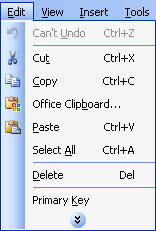
The Cut, Copy, and Paste operations can also be performed using these shortcut keys:
| Cut: | Ctrl + X |
| Copy: | Ctrl + C |
| Paste: | Ctrl + V |
 Cut from the Standard toolbar.
Cut from the Standard toolbar.
 Copy from the Standard toolbar.
Copy from the Standard toolbar.
 Paste from the Standard toolbar.
Paste from the Standard toolbar.
There might be occasions when you do something to a table—type the wrong number in a cell, for example—that you didn't mean to do. Fortunately, you can undo an operation in Access 2003. The Undo operation recovers the last single action performed.
Certain rules govern use of the Undo feature. First, the record needs to be edited in Datasheet view. Also, Undo becomes unavailable when:
To Undo the last change to the current field, use one of the following methods:
 Undo Current Field/Record from the menu bar.
Undo Current Field/Record from the menu bar.Spelling data correctly in Microsoft Access is essential. Sloppy data entry work—the customer name Smithsson is mistakenly typed when the name is actually Smithson—can potentially leave a contact out of future queries or reports. The Spelling Check feature searches for spelling errors in a table, form, or query. In a table, Spelling Check specifically checks the spelling of records, fields, or text within a field.
 Spelling from the menu bar, or press the F7 shortcut key. The Spelling dialog box opens.
Spelling from the menu bar, or press the F7 shortcut key. The Spelling dialog box opens.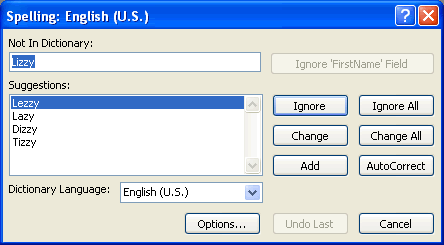
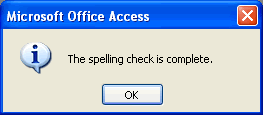
One or more table records can be deleted from an Access table at any time while in Datasheet view.

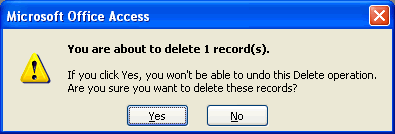

 Delete from the menu bar.
Delete from the menu bar.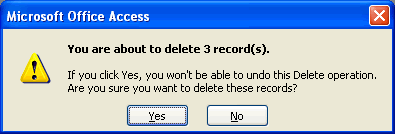
Important to remember:
 Deleting records is permanent. It cannot be reversed through an Undo operation. Use caution when the dialog box is displayed to confirm the record(s) to be deleted.
Deleting records is permanent. It cannot be reversed through an Undo operation. Use caution when the dialog box is displayed to confirm the record(s) to be deleted.

/en/access2003/adding-form-records/content/